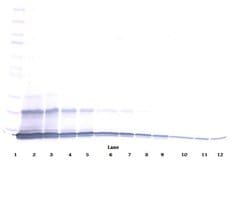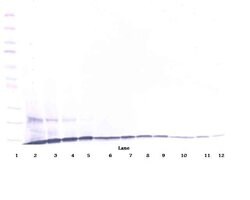Learn More
CCL23 Polyclonal Antibody, PeproTech®, Invitrogen™
Rabbit Polyclonal Antibody
$319.00 - $2175.00
Specifications
| Antigen | CCL23 |
|---|---|
| Concentration | 0.1-1.0 mg/mL |
| Applications | ELISA, Western Blot |
| Classification | Polyclonal |
| Conjugate | Unconjugated |
| Catalog Number | Mfr. No. | Quantity | Price | Quantity & Availability | |||||
|---|---|---|---|---|---|---|---|---|---|
| Catalog Number | Mfr. No. | Quantity | Price | Quantity & Availability | |||||
500P124100

|
Invitrogen™
500P124100UG |
100 μg |
Each for $319.00
|
|
|||||
500P1241MG

|
Invitrogen™
500P1241MG |
1 mg |
Each for $2,175.00
|
|
|||||
Description
AA Sequence of recombinant protein: RVTKDAETEF MMSKLPLENP VLLDRFHATS ADCCISYTPR SIPCSLLESY FETNSECSKP GVIFLTKKGR RFCANPSDKQ VQVCMRMLKL DTRIKTRKN. Preparation: Produced from sera of rabbits immunized with highly pure Recombinant Human MIP-3 (CCL23). Anti-Human MIP-3 (CCL23)-specific antibody was purified by affinity chromatography employing an immobilized Human MIP-3 (CCL23) matrix. Sandwich ELISA: To detect Human MIP-3 (CCL23) by sandwich ELISA (using 100 μL/well antibody solution) a concentration of 0.5-2.0 μg/mL of this antibody is required. This antigen affinity purified antibody, in conjunction with PeproTech Biotinylated Anti-Human MIP-3 (CCL23) (500-P124Bt) as a detection antibody, allows the detection of at least 0.2-0.4 ng/well of Recombinant Human MIP-3 (CCL23). Western Blot: To detect Human MIP-3 (CCL23) by Western Blot analysis this antibody can be used at a concentration of 0.1-0.2 μg/mL. Used in conjunction with compatible secondary reagents the detection limit for Recombinant Human MIP-3 (CCL23) is 1.5-3.0 ng/lane, under either reducing or non-reducing conditions.
This gene is one of several chemokine genes clustered on the q-arm of chromosome 17. Chemokines form a superfamily of secreted proteins involved in immunoregulatory and inflammatory processes. The superfamily is divided into four subfamilies based on the arrangement of the N-terminal cysteine residues of the mature peptide. This chemokine, a member of the CC subfamily, displays chemotactic activity on resting T lymphocytes and monocytes, lower activity on neutrophils and no activity on activated T lymphocytes. The protein is also a strong suppressor of colony formation by a multipotential hematopoietic progenitor cell line. In addition, the product of this gene is a potent agonist of the chemokine (C-C motif) receptor 1. Alternative splicing results in multiple transcript variants that encode different isoforms.Specifications
| CCL23 | |
| ELISA, Western Blot | |
| Unconjugated | |
| Rabbit | |
| Human | |
| P55773 | |
| 6368 | |
| E.coli-derived Recombinant Human MIP-3 (CCL23). | |
| Antigen affinity chromatography | |
| CCL23 |
| 0.1-1.0 mg/mL | |
| Polyclonal | |
| Lyophilized | |
| RUO | |
| PBS with no preservative | |
| C6 beta-chemokine; C-C motif chemokine 23; C-C motif chemokine ligand 23; CCL23; CCL23(19-99); CCL23(22-99); CCL23(27-99); CCL23(30-99); chemokine (C-C motif) ligand 23; Ck beta 8-1; CKb8; CKB-8; Ckb-8-1; CK-BETA-8; hmrp-2a; Macrophage inflammatory protein 3; MIP3; MIP-3; MIP-3CK-BETA-8; MPIF1; MPIF-1; MPIF-1Ckb-8-1; Myeloid progenitor inhibitory factor 1; SCYA23; small inducible cytokine subfamily A (Cys-Cys), member 23; Small-inducible cytokine A23 | |
| CCL23 | |
| Primary | |
| -20°C |
The Fisher Scientific Encompass Program offers items which are not part of our distribution portfolio. These products typically do not have pictures or detailed descriptions. However, we are committed to improving your shopping experience. Please use the form below to provide feedback related to the content on this product.


